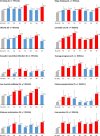Comparing relationships between single types of adverse childhood experiences and health-related outcomes: a combined primary data study of eight cross-sectional surveys in England and Wales
- PMID: 37068903
- PMCID: PMC10111913
- DOI: 10.1136/bmjopen-2023-072916
Comparing relationships between single types of adverse childhood experiences and health-related outcomes: a combined primary data study of eight cross-sectional surveys in England and Wales
Abstract
Objectives: Adverse childhood experiences (ACEs) show strong cumulative associations with ill-health across the life course. Harms can arise even in those exposed to a single ACE type but few studies examine such exposure. For individuals experiencing a single ACE type, we examine which ACEs are most strongly related to different health harms.
Design: Secondary analysis of combined data from eight cross-sectional general population ACE surveys.
Setting: Households in England and Wales.
Participants: 20 556 residents aged 18-69 years.
Measures: Ten self-reported outcomes were examined: smoking, cannabis use, binge drinking, obesity, sexually transmitted infection, teenage pregnancy, mental well-being, violence perpetration, violence victimisation and incarceration. Adjusted ORs and percentage changes in outcomes were calculated for each type of ACE exposure.
Results: Significance and magnitude of associations between each ACE and outcome varied. Binge drinking was associated with childhood verbal abuse (VA), parental separation (PS) and household alcohol problem (AP), while obesity was linked to sexual abuse (SA) and household mental illness. SA also showed the biggest increase in cannabis use (25.5% vs 10.8%, no ACEs). Household AP was the ACE most strongly associated with violence and incarceration. PS was associated with teenage pregnancy (9.1% vs 3.7%, no ACEs) and 5 other outcomes. VA was associated with 7 of the 10 outcomes examined.
Conclusion: Exposure to a single ACE increases risks of poorer outcomes across health-harming behaviours, sexual health, mental well-being and criminal domains. Toxic stress can arise from ACEs such as physical and SA but other more prevalent ACEs (eg, VA, PS) may also contribute substantively to poorer life course health.
Keywords: Child protection; Community child health; MENTAL HEALTH; PUBLIC HEALTH; Quality of Life; Substance misuse.
© Author(s) (or their employer(s)) 2023. Re-use permitted under CC BY-NC. No commercial re-use. See rights and permissions. Published by BMJ.
Conflict of interest statement
Competing interests: None declared.
Figures

 Difference not significantly different from No ACEs category
Difference not significantly different from No ACEs category  P<0.05 vs no ACEs category. ACEs, adverse childhood experiences; AP, alcohol problem; DV, domestic violence; MI, mental illness; PA, physical abuse; PS, parental separation; SA, sexual abuse; VA, verbal abuse.
P<0.05 vs no ACEs category. ACEs, adverse childhood experiences; AP, alcohol problem; DV, domestic violence; MI, mental illness; PA, physical abuse; PS, parental separation; SA, sexual abuse; VA, verbal abuse.Similar articles
-
Health and financial burden of adverse childhood experiences in England and Wales: a combined primary data study of five surveys.BMJ Open. 2020 Jun 7;10(6):e036374. doi: 10.1136/bmjopen-2019-036374. BMJ Open. 2020. PMID: 32513892 Free PMC article.
-
Adverse childhood and school experiences: a retrospective cross-sectional study examining their associations with health-related behaviours and mental health.BMC Public Health. 2025 Feb 18;25(1):672. doi: 10.1186/s12889-025-21788-3. BMC Public Health. 2025. PMID: 39966866 Free PMC article.
-
Does adult alcohol consumption combine with adverse childhood experiences to increase involvement in violence in men and women? A cross-sectional study in England and Wales.BMJ Open. 2018 Dec 6;8(12):e020591. doi: 10.1136/bmjopen-2017-020591. BMJ Open. 2018. PMID: 30523131 Free PMC article.
-
Life course health consequences and associated annual costs of adverse childhood experiences across Europe and North America: a systematic review and meta-analysis.Lancet Public Health. 2019 Oct;4(10):e517-e528. doi: 10.1016/S2468-2667(19)30145-8. Epub 2019 Sep 3. Lancet Public Health. 2019. PMID: 31492648 Free PMC article.
-
Is parental unemployment associated with increased risk of adverse childhood experiences? A systematic review and meta-analysis.J Public Health (Oxf). 2023 Nov 29;45(4):829-839. doi: 10.1093/pubmed/fdad069. J Public Health (Oxf). 2023. PMID: 37253685 Free PMC article.
Cited by
-
Adverse Childhood Experiences and Health Outcomes Among Transition-Age Autistic Youth.J Autism Dev Disord. 2025 Aug;55(8):2844-2857. doi: 10.1007/s10803-024-06401-7. Epub 2024 May 21. J Autism Dev Disord. 2025. PMID: 38771506 Free PMC article.
-
Associations Between Adverse Childhood Experiences and Prenatal Mental Health in the French EDEN Cohort: Cumulative, Person-Centered, and Dimensional Approaches.Depress Anxiety. 2025 May 6;2025:1295206. doi: 10.1155/da/1295206. eCollection 2025. Depress Anxiety. 2025. PMID: 40365618 Free PMC article.
-
Economic Burden of Health Conditions Associated With Adverse Childhood Experiences Among US Adults.JAMA Netw Open. 2023 Dec 1;6(12):e2346323. doi: 10.1001/jamanetworkopen.2023.46323. JAMA Netw Open. 2023. PMID: 38055277 Free PMC article.
-
Adverse Childhood Experiences and Associations with Mental Health, Substance Use, and Violence Perpetration among Young Adults in sub-Saharan Africa.Child Abuse Negl. 2024 Apr;150:106524. doi: 10.1016/j.chiabu.2023.106524. Epub 2023 Oct 26. Child Abuse Negl. 2024. PMID: 38854869 Free PMC article.
-
Comparative relationships between physical and verbal abuse of children, life course mental well-being and trends in exposure: a multi-study secondary analysis of cross-sectional surveys in England and Wales.BMJ Open. 2025 Aug 5;15(8):e098412. doi: 10.1136/bmjopen-2024-098412. BMJ Open. 2025. PMID: 40764071 Free PMC article.
References
Publication types
MeSH terms
Grants and funding
LinkOut - more resources
Full Text Sources
Miscellaneous
